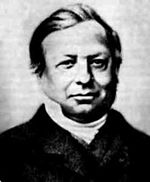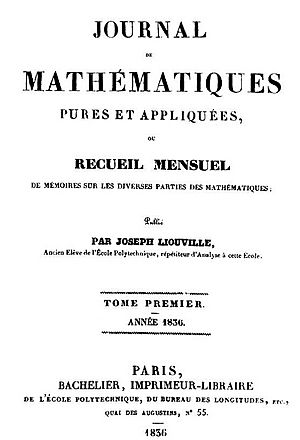Joseph Liouville facts for kids
Quick facts for kids
Joseph Liouville
|
|
|---|---|

Joseph Liouville
|
|
| Born | 24 March 1809 |
| Died | 8 September 1882 (aged 73) |
| Nationality | French |
| Alma mater | École Polytechnique |
| Known for | Sturm–Liouville theory Liouville's equation Liouville's Theorem (Complex Analysis) |
| Scientific career | |
| Fields | Mathematics |
| Institutions | École Centrale Paris École Polytechnique |
| Doctoral advisor | Siméon Poisson Louis Jacques Thénard |
| Doctoral students | Eugène Charles Catalan Nikolai Bugaev |
Joseph Liouville (born March 24, 1809 – died September 8, 1882) was a very important French mathematician and engineer. He made many big discoveries in different areas of mathematics. He also helped other mathematicians share their work.
Contents
Liouville's Early Life and Education
Joseph Liouville was born in Saint-Omer, France, on March 24, 1809. His father, Claude-Joseph Liouville, was an army officer. His mother was Thérèse Liouville.
In 1825, when he was 16, Liouville was accepted into the École Polytechnique. This was a very famous school in France. He finished his studies there in 1827. After that, he studied engineering at another school called École des Ponts et Chaussées. But Liouville decided he wanted to be a mathematician instead of an engineer.
A Career in Mathematics
After school, Liouville worked as an assistant at different places, including the École Centrale Paris. In 1838, he became a professor at the École Polytechnique. Later, he got a special position in mathematics at the Collège de France in 1850. In 1857, he also became a professor of mechanics at the Faculté des Sciences.
Liouville was not only good at math, but also at organizing things. He started a math journal called Journal de Mathématiques Pures et Appliquées. This journal is still very respected today. He created it to help other mathematicians publish their new ideas and discoveries.
One important thing he did was to recognize the amazing work of a young mathematician named Évariste Galois. Galois's work was not published before he died. Liouville found it and published it in his journal in 1846. This helped Galois's ideas become known to the world.
For a short time, Liouville was also involved in politics. He became a member of the Constituting Assembly in 1848. But after he lost an election in 1849, he decided to focus only on mathematics.
Liouville's Big Math Discoveries
Liouville worked on many different parts of mathematics. These included number theory, which is about numbers and their properties. He also worked on complex analysis, which deals with complex numbers. He studied shapes and spaces and mathematical physics, which uses math to understand how the world works. He even studied astronomy.
One of his most famous ideas is called Liouville's theorem. In number theory, he was the first to prove that certain numbers, called transcendental numbers, exist. He did this by using a special method with continued fractions. These numbers are now sometimes called Liouville numbers.
In mathematical physics, Liouville made two very important contributions:
- The Sturm–Liouville theory: He worked on this with another mathematician, Charles François Sturm. This theory helps solve certain types of math problems by breaking them down into simpler parts.
- Liouville's theorem in physics: This theorem explains how systems change over time in a special way. It's used in an area called Hamiltonian mechanics.
Liouville also came up with the idea of "action-angle variables." This helps describe certain systems in physics. Today, this idea is sometimes called the Liouville–Arnold theorem. The concept behind it is known as Liouville integrability.
Recognition and Legacy
Because of his important work, Liouville was recognized by many groups.
- In 1851, he became a foreign member of the Royal Swedish Academy of Sciences.
- In 1853, he was chosen as a member of the American Philosophical Society.
A crater on the Moon is named Liouville in his honor. Also, a special function in number theory, called the Liouville function, is named after him.
See also
 In Spanish: Joseph Liouville para niños
In Spanish: Joseph Liouville para niños
 | Victor J. Glover |
 | Yvonne Cagle |
 | Jeanette Epps |
 | Bernard A. Harris Jr. |


